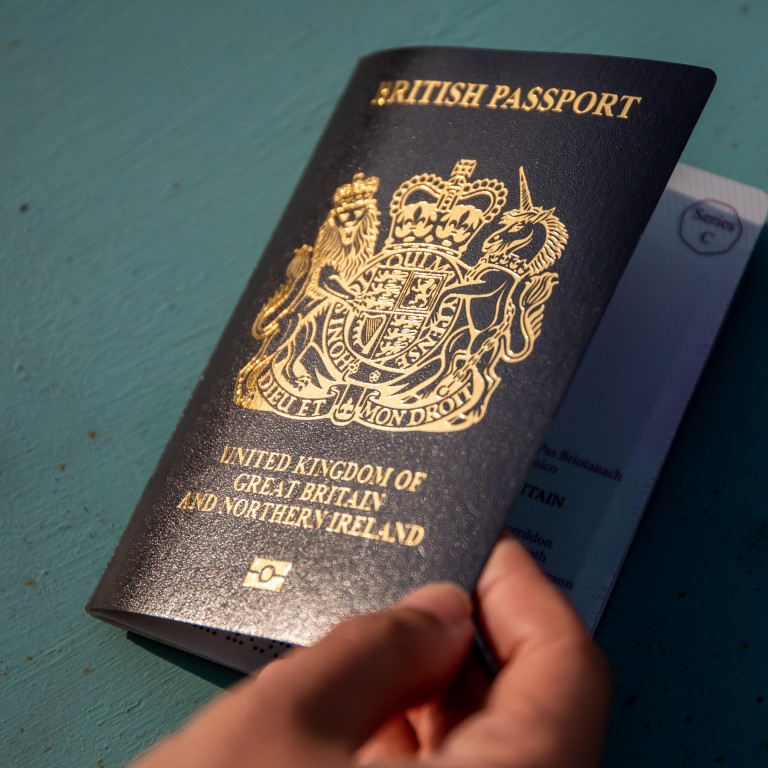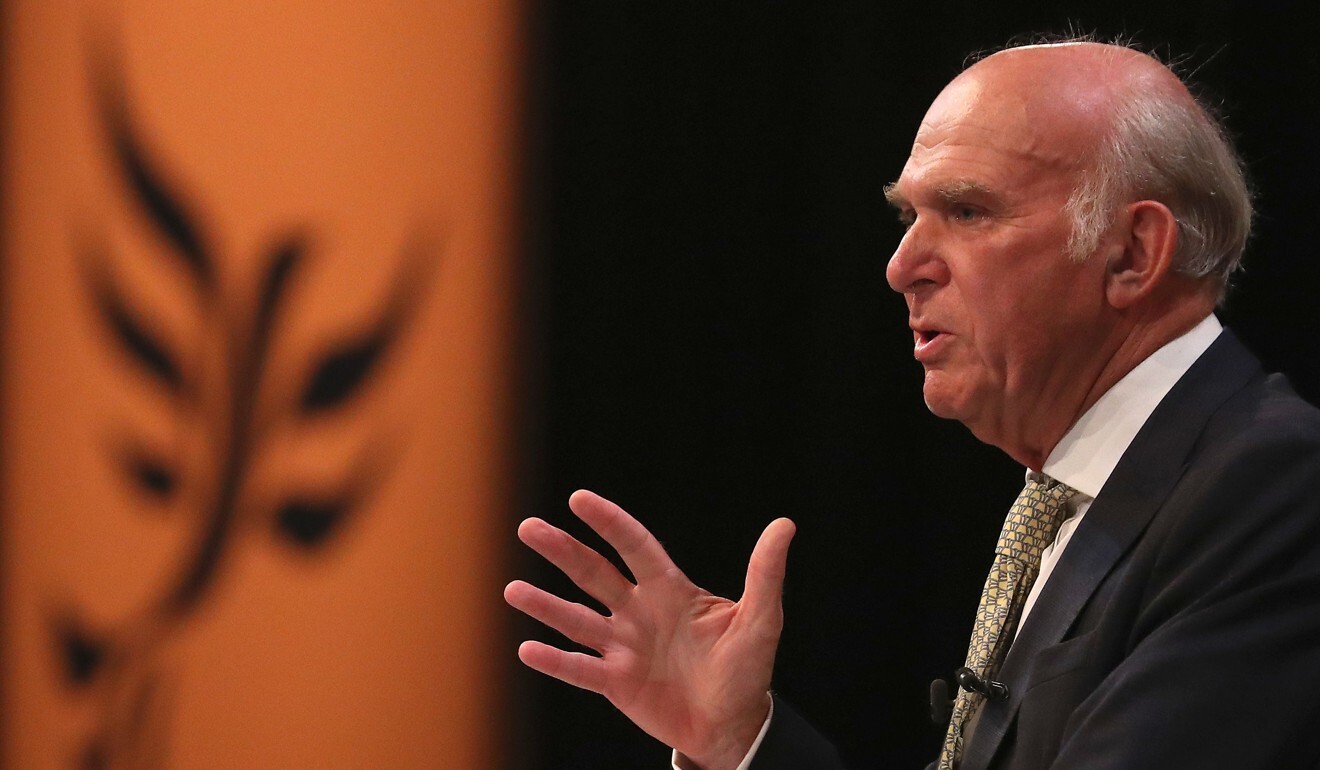
Britain’s China doves push back against ‘flag-waving’ rhetoric on Beijing
- British left accused of echoing former US president Donald Trump and other hardliners in calling for tougher line on Beijing
- Former Liberal Democrat leader says ‘simply shouting at China over human rights is unproductive’

In an interview with the South China Morning Post, Cable welcomed Britain’s scheme to offer visas to Hongkongers fleeing Beijing’s crackdown on the city, but said Boris Johnson’s government should not continue “lecturing” China on how to run the place.
“I understand the people feeling very upset and outraged about it but what is Britain going to do? What can we do, we no longer have a colonial empire,” he said.
And he accused the British left of echoing former US president Donald Trump and other hardliners in calling for a tougher line on China.
“The current political fashion is to be confrontational and that applies across the House of Commons, where it’s being led by the right, people like [former Conservative Party leader] Iain Duncan Smith and the China Research Group.
“But the Labour Party, [shadow foreign secretary] Lisa Nandy and [shadow Asia minister] Stephen Kinnock and my own party have echoed this new approach, which reflects what is happening in the US, where the offensive was led by Trump, but Biden’s people are taking it on,” said Cable, who retired as an MP in 2019.
British report takes aim at China over treatment of Uygurs
Cable is one of a few public figures to reject the dominant narrative on China, claiming the space for debate is shrinking in an increasingly polarised British political landscape.
He said he would “be much more careful” about what he said on China if he was still an MP or in the House of Lords – reflecting a common view among China doves in Britain that speaking out on such issues is not a great vote winner. He also admits he is “no expert on China”, and that he arrived at his views through research for a forthcoming book on the topic.
Meanwhile, Kinnock hit back at the suggestion that he was echoing the American right-wing on China.

However, there is also dissent among some Labour Party MPs towards this hardline approach.
Sir Mark Hendrick, the Labour MP for Preston in the northeast of England and former chair of the All Party Parliamentary China Group, said Britain’s China policy had been hijacked by a group of “flag-waving old Etonians around Westminster who hark back to the days of the empire and Winston Churchill”.
“We should start looking at trying to get a decent relationship with our neighbours in Europe, and solving some problems at Northern Ireland and the problems that we’ve seen with Brexit, instead of messing around with sending warships to the Far East,” said Hendrick, referring to recent British naval vessels sailing through the South China Sea.
British navy ‘shows global ambitions’ with South China Sea mission
The debate on China is growing increasingly hostile. Astrid Nordin, the Lau Chair of Chinese International Relations at King’s College London, said it is “bound up in broader polarisations in politics in general, maybe related to Brexit”.
“They may be related to the UK’s search for a meaningful identity outside the EU or trying to navigate how to relate to both China and the US, and how to imagine itself in this new context outside the EU,” Nordin said.
“But the context in which that’s happening, I think, is a global climate that pits an imagined China, either caricatured as the saviour of the world economy or equally caricatured as the devil that’s going to lead to the demise of all values that we hold dear. And that’s pitted against an equally imagined West in this kind of positive competition for power and values. And I think that this rhetoric has been quite strong in China for a long time,” she added.
The debate also rages within the governing Conservative Party, where two aggressive factions have emerged in the form of the China Research Group – an influential, policy-focused group of backbenchers – and the more hardline Inter Parliamentary Alliance on China, which includes members from the rest of the political spectrum and has grown in stature in recent months.
Britain, Canada, US and Taiwan popular options for Hongkongers leaving city
The Johnson government’s Integrated Review – a foreign policy document released earlier this year – attempted to straddle the pressure from these backbenchers with what proponents of engagement see as “common sense”.
Richard Graham, the former British trade commissioner for China who is now a Conservative MP and current chair of the All Party Parliamentary China Group, called for Johnson to ignore the noise and pursue a “Wimbledon view” to securing investment in its economy.
“The UK has always had the most open investment approach of all Western countries, historically, and we took what was broadly considered the Wimbledon view, i.e. that if we were hosting the world’s best tennis tournament, it didn’t matter so much who the winners were – the event was happening in UK,” Graham said.
“And if the UK is going to succeed after leaving the EU, it’s going to have to remain incredibly attractive and open to FDI from all over the world. The integrated review made it quite clear that this includes strong trade and investment with and from China.”
China plays up trade with Britain but seeks respect for sovereignty
Mark Logan, a Conservative MP representing Bolton, is arguably the current lawmaker with the most relevant recent China experience. He worked for more than a decade in Beijing and Shanghai as a diplomat and in private business, speaks Mandarin and is currently studying part-time for a PHD on the role of Parliament in shaping Sino-British relations.
“I think that it’s probably unfair to kind of ask other people to reach that level of nuance,” he said, referring to the level of debate on China, adding that it was one area “where I can speak a tiny bit more authoritatively than some of my colleagues”.
“You are going to find me finding a way for engagement more than most other MPs. And I don’t mince my words on that, because I think otherwise, things won’t end up in a very good place, bilaterally and for world stability,” he said, adding that these days, it is “not a very fashionable thing to say”.
Logan sees China as “the only issue I can see whereby the executive isn’t leading on the policy all of the time on every single issue”, with more clout on this issue falling to parliament.
“Everyone has their hobby horse,” he said.

